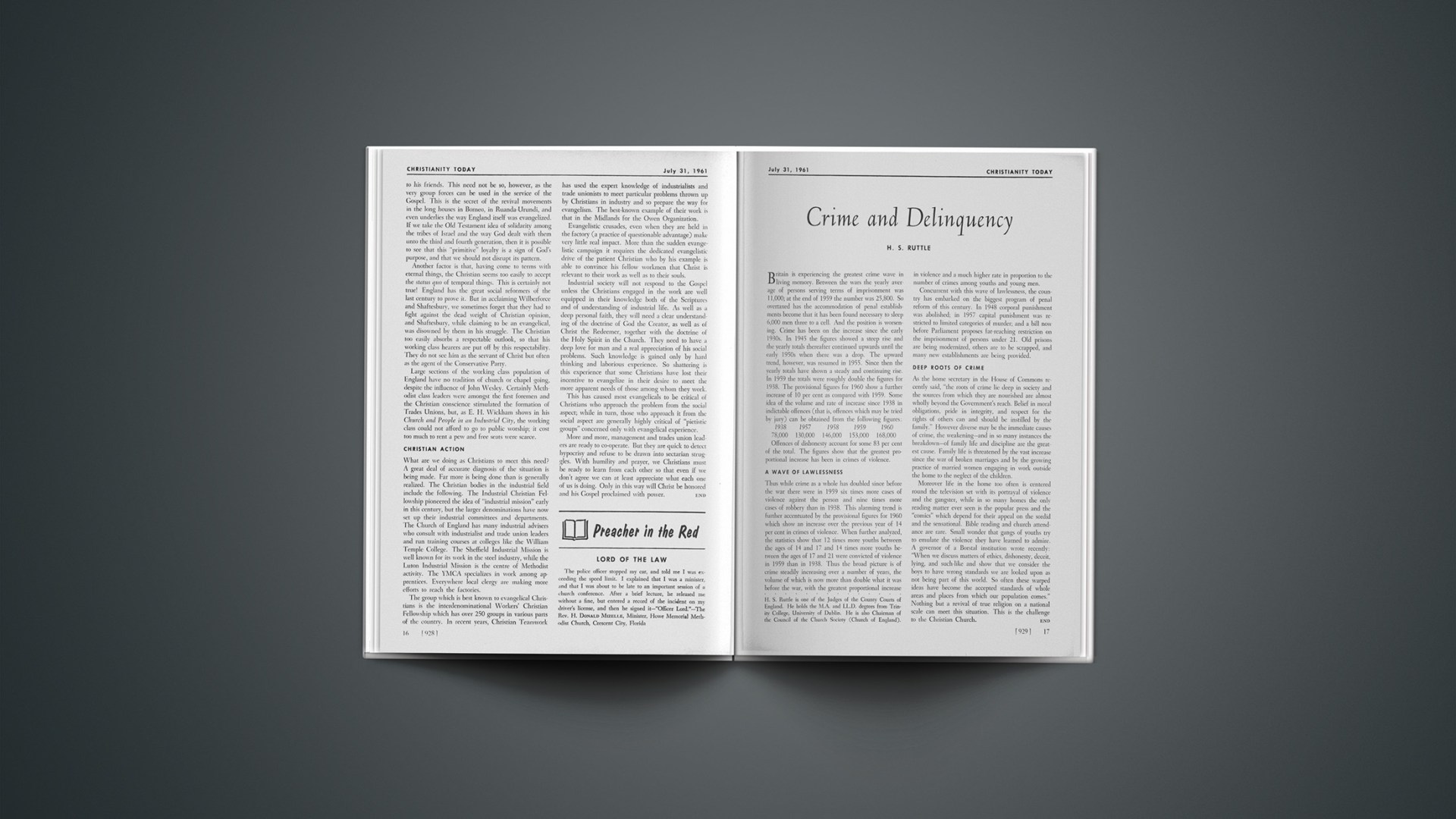Britain is experiencing the greatest crime wave in living memory. Between the wars the yearly average of persons serving terms of imprisonment was 11,000; at the end of 1959 the number was 25,800. So overtaxed has the accommodation of penal establishments become that it has been found necessary to sleep 6,000 men three to a cell. And the position is worsening. Crime has been on the increase since the early 1930s. In 1945 the figures showed a steep rise and the yearly totals thereafter continued upwards until the early 1950s when there was a drop. The upward trend, however, was resumed in 1955. Since then the yearly totals have shown a steady and continuing rise. In 1959 the totals were roughly double the figures for 1938. The provisional figures for 1960 show a further increase of 10 per cent as compared with 1959. Some idea of the volume and rate of increase since 1938 in indictable offences (that is, offences which may be tried by jury) can be obtained from the following figures:
Offences of dishonesty account for some 83 per cent of the total. The figures show that the greatest proportional increase has been in crimes of violence.
A WAVE OF LAWLESSNESS
Thus while crime as a whole has doubled since before the war there were in 1959 six times more cases of violence against the person and nine times more cases of robbery than in 1938. This alarming trend is further accentuated by the provisional figures for 1960 which show an increase over the previous year of 14 per cent in crimes of violence. When further analyzed, the statistics show that 12 times more youths between the ages of 14 and 17 and 14 times more youths between the ages of 17 and 21 were convicted of violence in 1959 than in 1938. Thus the broad picture is of crime steadily increasing over a number of years, the volume of which is now more than double what it was before the war, with the greatest proportional increase in violence and a much higher rate in proportion to the number of crimes among youths and young men.
Concurrent with this wave of lawlessness, the country has embarked on the biggest program of penal reform of this century. In 1948 corporal punishment was abolished; in 1957 capital punishment was restricted to limited categories of murder; and a bill now before Parliament proposes far-reaching restriction on the imprisonment of persons under 21. Old prisons are being modernized, others are to be scrapped, and many new establishments are being provided.
DEEP ROOTS OF CRIME
As the home secretary in the House of Commons recently said, “the roots of crime lie deep in society and the sources from which they are nourished are almost wholly beyond the Government’s reach. Belief in moral obligations, pride in integrity, and respect for the rights of others can and should be instilled by the family.” However diverse may be the immediate causes of crime, the weakening—and in so many instances the breakdown—of family life and discipline are the greatest cause. Family life is threatened by the vast increase since the war of broken marriages and by the growing practice of married women engaging in work outside the home to the neglect of the children.
Moreover life in the home too often is centered round the television set with its portrayal of violence and the gangster, while in so many homes the only reading matter ever seen is the popular press and the “comics” which depend for their appeal on the sordid and the sensational. Bible reading and church attendance are rare. Small wonder that gangs of youths try to emulate the violence they have learned to admire. A governor of a Borstal institution wrote recently: “When we discuss matters of ethics, dishonesty, deceit, lying, and such-like and show that we consider the boys to have wrong standards we are looked upon as not being part of this world. So often these warped ideas have become the accepted standards of whole areas and places from which our population comes.” Nothing but a revival of true religion on a national scale can meet this situation. This is the challenge to the Christian Church.
Samuel M. Shoemaker is the author of a number of popular books and the gifted Rector of Calvary Episcopal Church in Pittsburgh. He is known for his effective leadership of laymen and his deeply spiritual approach to all vital issues.










